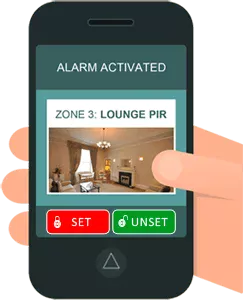Alarm King
Self-Monitored Alarms
Introducing a contemporary upgrade to home security: self-monitoring. This advanced method offers you complete control and direct alerts to your smartphone, setting it apart from traditional systems.
What are self monitored alarms?

Unlike basic dialers that merely send an SMS or a pre-recorded message upon activation, self-monitored alarms integrate with your smartphone through a specialized app. This provides a richer, more interactive experience, allowing you to monitor and control your home security directly.
As smart home technology progresses, the traditional dialer systems' limitations became apparent, prompting a shift towards more dynamic and versatile solutions. Now, in 2024, self-monitored alarms offer functionalities that are far more sophisticated and user-centric.
Communication Methods to Connect Your Alarm:
- IP Connectivity
- 3G/4G Connectivity
IP Connectivity
Harness the power of IP connectivity by linking your alarm system to your broadband router, which has become a standard fixture in most homes. This connection uses Internet Protocol (IP) to maintain a permanent link between your alarm system and a secure cloud service, managed by the alarm manufacturer.
How It Works:
Once an IP module is integrated into your alarm system, you simply download the manufacturer's secure app to your Android or iOS device. This app securely connects to the cloud, enabling continuous self-monitoring of your property.
Cost-Effective: Eliminates the monthly fees associated with traditional Alarm Receiving Centre (ARC) monitoring.
Utilizes Existing Infrastructure: Leverages the broadband most households already have. Immediate Notifications: Sends push alerts directly to your smartphone if the connection to the alarm panel is lost, keeping you informed at all times.
Vulnerability to Power Issues: Susceptible to disruptions caused by power outages or internet connectivity issues. While uninterruptible power supplies (UPS) or routers with backup batteries can mitigate this, not all homes are equipped with such solutions.
Continuous Internet Requirement: Requires that your broadband be active 24/7, even during holidays.
Potential Additional Costs: Some providers may charge a fee for cloud connection.
3G/4G Connectivity
Assuming you have a strong 3G signal in your property (4G's even better, 5G would be awesome), your alarm system, with the correct GSM module fitted, can use the mobile networks to self-monitor
People consider the 3G network a more secure single-path as it's less likely to go down, or be tampered with, compared to your internet connection.
While a mains fail at your property would typically result in your router going offline, it would not interfere with your 3G signal.
A good installer would recommend a SIM card from an M2M provider, like CSL DualCom, as their SIMs will connect to any of the big 4 mobile operators. CSL's Gemini Network constantly polls the SIM and will automatically switch it onto the strongest mobile network.
The one downside; it's more expensive than using your home broadband as you need to pay the monthly fee for the SIM card.
With your alarm system now connected to the cloud, by either medium, you can now monitor and control your alarm system at the touch (and swipe) of a fingertip via the secure app. Most alarm manufacturers on the market today offer the functionality to remotely set/unset the alarm from an app as well as receive status updates. For example get notified when someone arms/disarms the system or an alarm's been triggered.
There's more cools things you can do from the app. With IP cameras connected to the alarm you could actually see what's going in your property when the alarm is triggered, but we're now getting into the realms of smart alarms
3G and 4G networks are less likely to go down compared to your internet connection
If one network did go down, the SIM would roam onto next strongest network
Not reliant on having a fixed line with internet connection
More expensive, when compared to IP, as there's monthly SIM costs
May not be an option for rural locations with poor GSM signal
So which method of monitoring is right for you?
There's no right (or wrong) answer to this.
Often the decision is based on what technology is available at your property. If you have good 3G or 4G coverage and also home broadband you have a decision of cost vs risk.
If you want to be super cautious, you can, of course, combine the two and have dual-path self-monitoring, where one would take over if communication path was lost on the other.
Broadband could be your primary path (with an IP module fitted to your alarm system) and 3G could be your secondary path (with a GSM module fitted), although this is not typically required with a residential alarm system.
Interested in a safer home?
For more detailed advice tailored to your unique situation and a free quote, contact us today.